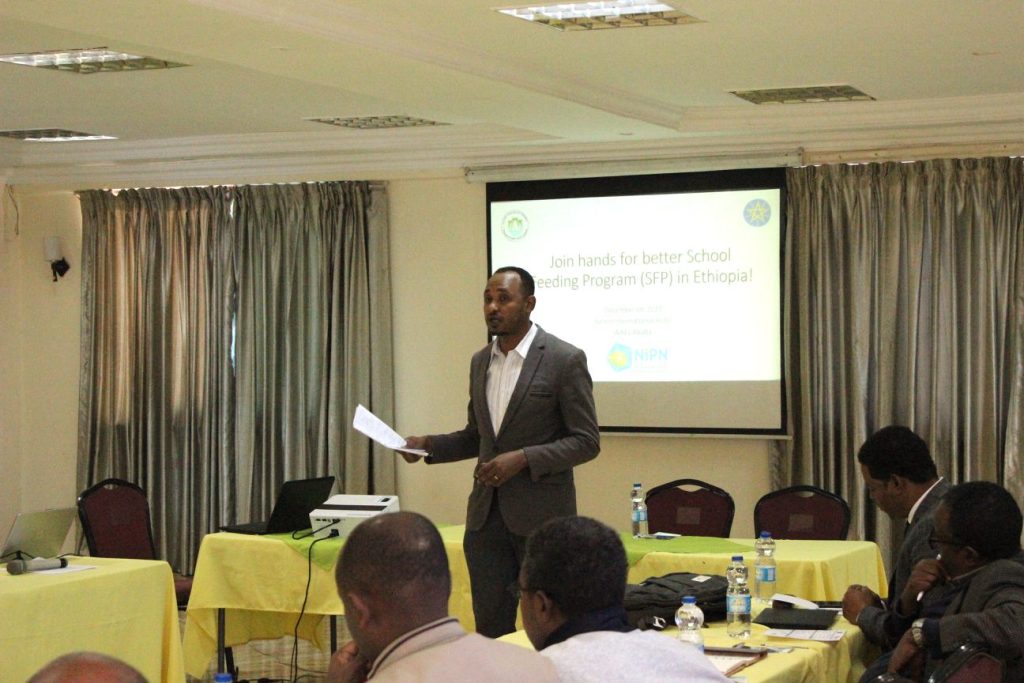EPHI Consulted on School Feeding Program

The Ethiopian Public Health Institute (EPHI) has conducted a day-long consultative workshop on “Analysing the Impacts of School Feeding Program (SFP)” in partnership with the National Information Platform for Nutrition (NIPN), the International Food Policy Research Institute (IFPRI), and the Deutsche Gesellschaft für Internationale Zusammenarbeit (GIZ).
Director of the Food Science and Nutrition Research Directorate (FSNRD) of EPHI, Dr. Masresha Tessema, said in his opening speech that every child has the right to get a healthy diet. Masresha said that children should be provided with a sufficient and healthy diet so that they regularly go to school and follow their lessons attentively. To realise this, SFP should be intensified in a sustainable manner, according to him
“The SFP is one of the flagship activities of the government. However, this should not be left to the government alone. It rather needs support from both national and international bodies. The Ethiopian Public Health Institute (EPHI) is doing its part to ensure the successful implementation of the SFP,” he said.
Dr. Masresha has touched on the substantial research that has been conducted by the NIPN team and other EPHI directorates on the impact of SFP on school attendance, learning outcomes and its influence on child nutritional status. “However, the implementation of SFP in Ethiopia has been constrained by several factors and implementation challenges. The effectiveness of these programs may depend on factors such as the quality and quantity of food provided, funding, community engagement, government policies, and regulations,” the FSNRD Director said.
Dr. Masresha applauded the joint efforts of EPHI, GIZ, and IFPRI to fill the gap observed in the SFP. These partners have reportedly generated various pieces of evidence that have the potential to guide the decision-making process for better health and nutrition through sustainable school meals.
Educational Infrastructure and Service Desk Head with the Ministry of Education, Dawit Azene said in his keynote speech that the SFP, which was started in areas that were suffering from food shortages, has now been intensifying in other areas. Dawit said that inadequate quality and quantity of food affect the teaching and learning process. “If we want our students to stay at school, we need to provide them with sufficient and sustainable feeding.”
The Seqota Declaration (SD) Assistant Program Manager, Fesseha Tekele, said on behalf of Dr. Sisay Sinamo, Senior Program Manager of Seqota Declaration that as SFP “is one of the key performances of SD”, the unit would welcome and support every activity. Fesseha has also expressed appreciation to all who have been involved in this national effort.
NIPN Coordinator, Dr. Aregash Samuel, said that EPHI/NIPN has taken the responsibility of bringing together all stakeholders for this national initiative. “We need to do the best of our capacity to feed our children at school. I call upon you all to join hands to maintain the sustainability of the initiative,” she said. Dr. Aregash expressed appreciation and extended gratitude to all partners who have taken part in this national effort.
Representatives from EPHI, IFPRI, and ILRI presented on the occasion summary briefings of research findings on School Feeding.
The organizing team expressed that the workshop was held with the purpose of analysing the impact of school feeding programs on school attendance, learning outcomes, and children’s nutritional status.
NIPN, which aims to facilitate evidence-based decision-making for nutrition in Ethiopia, has conducted extensive research in this area. However, the implementation of the school feeding program in Ethiopia has faced various challenges, including factors such as food quality and quantity, funding, community engagement, and government policies.
The valuable evidence, which was generated jointly by EPHI, IFPRI, and GIZ, can reportedly guide decision-making processes for improving health and nutrition through sustainable school meals. This was taken as a solution to address the challenges witnessed in SFP, according to the Workshop organizing team.
Over 44 participants, drawn from WFP, UNICEF, FAO, Save the Children, ILRI, Concern World Wide, Addis Ababa University, IFPRI, EPHI/NIPN, Food Science and Nutrition and Research Directorate, and Knowledge Translation Directorate), Results for Development, the Ministry of Education, Ministry of Health, Regional Administrations, and others, were in attendance at the Consultative Workshop.
